To celebrate the release of Star Trek: Into Darkness this month, we’ll be running through the first season of the classic Star Trek all this month. Check back daily to get ready to boldly go. It’s only logical.
I knew we were due a nice Shakespearean title soon. And The Conscience of a King is just around the corner, to boot. Seriously though, I have to admit a massive fondness for these wonderfully lofty and high-minded episode titles. It’s something that links the original Star Trek and Star Trek: Deep Space Nine quite firmly, and was sadly never enthusiastically taken up by any of the other spin-offs. It’s a shame, because – regardless of the quality of the episodes in question – there’s something undeniably endearing about forty-five minutes of television given a pretentious name like For the World is Hollow and I Have Touched the Sky, The City on the Edge of Forever or Wrongs Darker Than Death or Night.
I promise I’ll start talking about the episode soon, but I think it’s great that the show could come up with these sorts of titles. You could make an argument that episode names should be efficient and descriptive. After all, there are over 700 episode of Star Trek to choose from, and a boring-yet-efficient name like The Price is probably a bit easier to remember and to drop into conversation than something like Dagger of the Mind or What Are Little Girls Made Of?
Hardcore fans know the show by rote, of course, but I reckon it might be fun to ask casual fans to link some of the more creative and poetic names to the actual episodes. You could probably make a more case for a more efficient naming scheme, similar to the way Friends titled most episodes The One With… A naming convention like that makes it a lot easier to link the episode to the core concept and renders it a lot easier to know which episode you are talking about.
I can understand that appeal. Truth be told, talking to casual Star Trek fans, I’m more likely to use a looser identifier to distinguish the episode I’m talking about. Using that approach, Wrongs Darker Than Death or Night is “the one with Kira’s mum”, and Let He Who Is Without Sin… becomes “the crap one with Vanessa Williams.” Of course, generic names can occasionally be counter-productive. There are quite a few episodes that the title Emissary could apply to, beyond the two including the word. The Host is another Star Trek special that could probably be fitted to half a dozen different adventures.
Still, ignoring such practical concerns, I like my fancy-sounding Star Trek names. There’s something really nice about giving a crazy story about how McCoy was dying for about a week a very pompous-sounding title that could easily have been borrowed from classic literature. It’s that wonderful combination of highly campy and incredibly earnest that really defines the classic Star Trek, the sense that show is aware of the limitations of sixties television, and remains breathtakingly ambitious anyway. How can you not love that?
Anyway, we should probably talk about the actual episode. Dagger of the Mind is – of course – lifted directly from Macbeth. As the title implies, there’s a whole load of mind-screwing going on, even if it has relatively little to do with the actual context of Shakespeare’s famous soliloquy. Still, there are minds, and those are being harmed by a device, so Dagger of the Mind works in context. Plus, as noted above, it’s just a really great title for an episode of sixties science-fiction.
One of the great indications of how massively iconic and influential Star Trek has become can be seen in the way that even the “less important” aspects of the show have bled outwards from the series to mingle with pop culture as a whole. When I think of Dagger of the Mind, I don’t actually think about this Star Trek episode. I don’t think about the weird subplot involving Noel living out her weird sexual fantasies inside Kirk’s imagination. I don’t think about Van Gelder hiding inside a barrel beamed up from the surface.
I think about South Park.
And, of course, with that sentence, I lose any credibility that I had as a writer covering Star Trek. In my defence, I do think about the iconography of the episode. I think about the machine that empties people’s minds. I even think about the logo of the colony and the blue overalls worn by the staff. However, I also think about a planetarium (or plane’arium) brainwashing young kids in order to keep them coming back for more.
Dagger of the Mind isn’t an iconic Star Trek episode. It was produced following Balance of Terror and What Are Little Girls Made Of?, so it’s coming off the heels of two massively influential adventures. However, it doesn’t feature any especially memorable monsters or aliens. It doesn’t have an especially compelling hook (“mental healthcare… in the future!”). It does have the first ever Vulcan Mind Meld, but it feels almost incidental. So it’s weird that South Park zeroed in on this episode to parody in Roger Ebert Should Lay Off the Fatty Foods.
And yet, in spite (or perhaps because) of the fact that this isn’t an episode that has ever been a focal point for Star Trek parody or discussion, South Park was able to craft a rather wonderful little adventure out of making fun of Dagger of the Mind. I think it’s a demonstration of the fact that even relatively average Star Trek is still brilliantly (and crazily) eccentric, and still very definitely Star Trek. There’s something about the iconography and the imagery that sort of sticks with you, even if it manifests itself thirty years later in an obscene cartoon.
And, despite the fact that Dagger of the Mind isn’t quite as iconic as most of the episodes before it, it is still a solid piece of Star Trek. The first season of Star Trek might not produce thirty masterpieces in a row, but the season only has one truly spectacular misfire. And Dagger of the Mind is not that misfire. Even when this first year of the show isn’t necessarily iconic are genre-defining, it’s still well-constructed and thoughtful… and fun.
Although we’re about to watch an adventure about illegal experimentation on one of the most vulnerable groups in society, Dagger of the Mind has a very weird energy to it. It’s something that probably should seem dissonant or out-of-place, but it winds up feeling like some crazy genre mash-up. Dagger of the Mind is part institutional thriller, part escape film and part non-relationship drama, as Kirk tries to deal with the aftermath of a social mistake at the Christmas Party. Yes, the Enterprise has a Christmas Party. See what I meant when I said “weird energy”?
Let’s talk about that last thing first, because it’s actually kinda fun. Sure, it gets kinda sexist very quickly, but we’ll deal with that in a moment. It’s interesting to think that we’re about a third of the way through the first season, and I really haven’t cracked too many jokes about Kirk’s libido. After all, the popular image of Captain Kirk is as a half-charming and half-sleazy intergalactic sexual monster, radiating enough raw sexual energy that you can’t use a mobile phone near him. If popular culture is to believe, he has a habit of loving and leaving beautiful women, and scratching notches on his bed post.
I’ll be the first to concede that Star Trek can be quite sexist and that the show’s attitudes towards women leave a lot to be desired. However, Kirk’s reputation is somewhat exaggerated. The last episode, What Are Little Girls Made Of? represents the first time that Kirk overpowered a foe using his romantic charms. Sure, there’d be a few more in the seasons ahead, and the revelation that Kirk had a child he never knew about in Star Trek II: The Wrath of Khan probably doesn’t help, but Kirk isn’t quite the interstellar Casanova that people tend to think that he is.
However, you can see his reputation being established at this point in the show’s history. What Are Little Girls Made Of? gave us Kirk using his sexuality as a potent weapon. Keep your androids away from his sexual magnetism. The next episode, Miri, will play with that idea. However, Dagger of the Mind gives us Kirk making a flirtation-related mistake that would probably have landed any of his successors in front of Starfleet’s Human (and alien) Resources.
To be fair, the details of what happened at that Christmas Party are vague. We see Noel (whose name means Christmas… geddit?) play out her fantasy version of the scene. It involves a great deal of casual no-strings sex. “I mean, just having met like this,” she protests as he carries her to the bedroom. “Of course, it would be different if you cared for me.” Her fantasy Kirk is a man of action, though, and protests that he’s just in it for the sex. “You want me to manufacture a lie, wrap it up as a Christmas present for you?”
It’s a weird little scene, in a great many ways. Let’s just mention the fact that her fantasy features a version of herself who clearly wants a romance, while her fantasy version of Kirk very clearly just wants no-strings sex. There’s nothing wrong with casual no-strings sex, but it seems weird that Noel’s fantasy is to have Kirk refuse to acknowledge that he cares for her, despite the fact she seems to want that sort of commitment before sleeping with him. It sort of implies that women clearly don’t know what they want, and just need a strong a man to tell them what is what before dictating how sex is going to happen. Which sort of brings in that “sexism” stuff I was talking about earlier.
Anyway, let’s gloss over the particulars of the psychology of Noel for the time being. It’s quite obvious that Kirk didn’t whisk Noel away to a bedroom and make sweet no-strings-attached-even-though-you-want-them love to her. He’s not that unprofessional and creepy. However, it’s clear that Kirk crossed some sort of line with the young officer, one unbecoming a starship captain. Noel’s girly crush on Kirk is inappropriate and awkward, but it’s clear the awkwardness isn’t just on her side. Kirk acts like he has something he’s ashamed of, beyond her obviously inappropriate fantasies about him.
“Don’t you remember the science lab Christmas party?” she asks. He brushes her off, “Yes, I remember.” She tries to elaborate, “You dropped in –“ Kirk cuts her off before he can elaborate further. He responds, “Yes, yes, I remember.” Perhaps it’s down to the way that Shatner delivers the lines. Kirk doesn’t sound like he’s being dismissive of Noel. Instead, he sounds like he doesn’t want to be reminded of some indiscretion. The only confirmed details of that night suggest a light drink and some nice conversation. Perhaps they kissed under the misletoe? Or perhaps he just said something inappropriate to a member of his staff?
Even if Kirk’s conduct on the night was perfectly on the level, there’s still something a little creepy about the way that McCoy and Kirk treat Noel. It’s obvious she has some affection for Kirk, and it seems like everybody knows it. Her assignment to the team is treated as a private joke between the captain and his doctor. McCoy is smirking as he assigns her. For his part, Kirk treats Noel as a jab from McCoy rather than as a person in her own right.
“Mister Spock,” he advises his second-in-command, “you tell McCoy that she had better check out as the best assistant I ever had.” However embarrassing her unprofessional crush on her superior might be, it seems like none of the men on the Enterprise treat her with the respect becoming a co-worker. In a way, this is much less flattering to Kirk than anything that the episode implies might have occurred between the pair at that fateful Christmas Party. Although I do like to think that the only reason this is the only Christmas Party referenced in Star Trek is because Kirk banned them following this incident.
Of course, Noel herself is an unfortunate character. Her crush on Kirk is unprofessional, but it doesn’t warrant the way her male co-workers treat her like the butt of a joke played on the captain. However, there’s something very creepy about the way she tries to re-write Kirk’s memory of that particular evening. “I suggest now that it happened in a different way,” she offers, as she subjects a complete captive and helpless Captain Kirk to her sexual fantasy. While Kirk’s conduct is hardly the most professional, he actually comes across as the most sexually harassed character in the episode.
It isn’t a flattering portrayal of women. Apparently Noel is so fixated on the hunky commanding officer that she can’t resist the urge to place her own sexual fantasies into his head. If he did the opposite, we’d be screaming bloody murder – but the episode assumes that Kirk is more professional than that. Noel, on the other hand, can’t help but give into Kirk’s sexual charisma. This is despite the fact that she’s clearly a professional with a wealth of education and experience. Because, apparently, underneath it all, Noel is just a woman.
It’s another one of those awkward sexist moments from Star Trek that feels all the more alarming for how casual it is. Like Spock’s last-minute aside to Rand at the end of The Enemy Within, it seems like we’re supposed to laugh at this portrayal of women. It is very difficult to believe that – even in the sixties – attitudes towards women could be so casually sexist that these sorts of moments could make it through to the finished cut of the episodes in question.
Apparently, the original draft of Dagger in the Mind was to feature Janice Rand, who has already begun to drift towards the back of the cast and who will be departing the show quite shortly. (Although the next episode, Miri, would feature her quite heavily.) Actress Grace Lee Whitney has explained in her biography, My Longest Trek, why she feels Rand was written out of this episode:
So why was I written out of Dagger of the Mind? I believe it was because the episode, as originally written, brought the repressed attraction between Kirk and Rand too much out in the open. The Christmas party scene where Kirk and Rand flirt, dance, kiss and go to bed together is so overt that it really would have painted Captain Kirk into a corner. Certainly such a scene went far beyond the Matt Dillon-Miss Kitty chemistry that Gene Roddenberry had initially envisioned for the captain and the yeoman.
According to The Making of Star Trek: The Motion Picture, Rand would be written out of the show in order to allow Kirk to engage in these sorts of casual romances. So, in a very tangible way, Rand’s absence in Dagger of the Mind really sets the stage for her approaching absence from the series in general.
The character of Rand was removed at the behest of the network, with Roddenberry taking the opportunity of Star Trek: The Motion Picture to bring Grace Lee Whitney back to Star Trek:
Grace Lee Whitney returns to Star Trek: The Motion Picture in the role of Transporter Chief Janice Rand, a promotion for her character from that of yeoman in the first season of the Star Trek television show, in which she played the captain’s yeoman, a job which included being everything from Captain Kirk’s secretary to his personal valet. There was little doubt that Yeoman Rand was also in love with her captain. However, by the second season the network insisted that the good captain should have many girl friends and romances, all to be provided by a succession of female guest stars, so Yeoman Janice faded from sight. (Roddenberry stated many times in the intervening years that he had been mistaken in yielding to network pressure, and should have retained Grace Lee Whitney and Yeoman Rand on the series.)
Of course, this version of events is muddied somewhat by revelations in Whitney’s biography, where she implies that this official reason for firing her was not the real reason that she was released from the show:
“Well,” Alex explained, “I’m told it’s a creative decision. The producers feel the romantic relationship between Kirk and Rand is becoming too obvious, and it limits the story possibilities. Apparently, they think Captain Kirk needs to be free to have affairs with other women on all these different planets. If the relationship between Kirk and Rand is too intense, it looks like he’s two-timing Janice Rand. The viewers will get mad at Kirk and tune out. At least, that’s what they tell me.”
The explanation tasted bitter in my mouth. I couldn’t help noticing that the reasoning behind it was completely the opposite of what The Executive had said to me the previous Friday night — about how the Kirk-Rand relationship could be strengthened, and about all the wonderful story possibilities that would result from expanding my role.
Taken in the context of later revelations about Whitney’s sexual assault from an unnamed executive, it’s hard to imagine that the official version of events is entirely accurate or reliable. Still, Rand’s absence from Dagger of the Mind is quite conspicuous, and it seems to foreshadow the character’s subsequent departure from the series. After all, Dagger of the Mind confirms Kirk as something of a womaniser, even if not nearly to the extent that pop culture would have you believe.
Dagger of the Mind is also the first time we get a hint that the Federation might not be all smiles and sunshine. Of course, the Federation doesn’t exist yet. It is first mentioned in Arena, with the full title given in A Taste of Armageddon. The Enterprise has – to this point – been in the service of any number of bodies. Indeed, it’s still associated pretty much exclusively with Earth, repeatedly referred to as an “Earth ship” or as part of the United Earth Space Probe Agency.
As a side note, Dagger of the Mind also continues to suggest that Earth is now a one-world government, with a consignment destined for “Stockholm, Eurasia, NE.” That has been one part of the Star Trek mythos that has been consistently established and maintained since the show came on the air. That said, there’s still not too much evidence of an interstellar coalition yet. Adams, his staff and his patients are all human. Spock would seem to be an alien serving on a human ship, rather than a Federation member on a Starfleet ship.
Anyway, even if it doesn’t have a name yet, Dagger of the Mind is the first real trace of cynicism we’ve had about Kirk’s employers. Sure, Star Trek acknowledged that space seems to make people mad as early as the first episodes produced (Where No Man Has Gone Before) and aired (The Man Trap). Adams isn’t the first insane human character we’ve seen in the far reaches of space. The difference here is that Adams holds legitimate authority. He’s not an outsider, or a fringe personality toiling alone in obscurity.
Apparently, based on what Kirk tells Bones, Adams is one of the most respected people in the Federation. He’s an expert on prison, treatment and reform. His writings on penology are apparently well-regarded across the cosmos. This isn’t a lonely old scientist on a distant rock like Robert Crater. This the governor of his own penal colony, a colony that those in authority trust Adams to run with a minimum amount of supervision.
Which is interesting, as an aside. Of course, placing these sorts of individuals on a desolate rock on the far side of the galaxy has historical precedent. England used to ship its criminals and unwanted across the planet to Australia, so it’s not too hard to believe that – given the chance – Earth would send its troubled souls to some godforsaken planet in the middle of nowhere. For the first time, Starfleet feels like a very impersonal organisation.
In Where No Man Has Gone Before, we saw abandoned fuel outposts that rarely saw traffic, but Roddenberry’s futuristic utopia has generally favoured human contact. The isolation of the miners in Mudd’s Women was treated as a tragic necessity. When Kirk met up with the crew of the Antares in Charlie X, he was polite and cordial – everybody involved seemed to enjoy the contact. Kirk even offered to share some seedy-sounding “entertainment tapes.”
The last time that the Enterprise visited a human outpost on a far-flung world, Kirk explained that it was policy to check in on human activity at the fringe of known space at regular intervals. It seems a prudent move, given how crazy these outliers tend to be in the Star Trek mythos, but it also suggested that the Federation was mindful of the psychological pressures of space. It created the impression that human beings tried to do what they could to keep in touch across the void, despite the obvious logistical difficulties.
In contrast, the Enterprise can’t seem to get away from Tantalus quickly enough. They beam down the cargo, say a quick hello and then continue on their way. They are a decent distance away before anybody even realises that Van Gelder is on board. As Kirk notes in his log, “Exchanged cargo with penal colony on Tantalus V. Have departed without going ashore.” Given the horrors we learn are going on there, this seems almost recklessly indifferent. Even without those concerns, the whole process is all very mechanical, all very far removed.
Even the name of the colony seems rather ominous. There are no natives around, so one assumes the humans named the colony after a mythological figure most notably associated with the deep abyss that Greek mythology reserved as a dungeon filled with torment and suffering. It doesn’t conjure up images of rehabilitation or counselling. Instead, it’s a name associated with the Greek underworld, a place of eternal suffering. Pleasant.
Of course, this is the point of Dagger of the Mind, which seem intent on questioning the trust afforded to the state or authority in these circumstances.“I would like to have met Doctor Adams,” Kirk muses as they leave. “Have you ever been to a penal colony since they started following his theories?” McCoy responds, “A cage is a cage, Jim.” Kirk smirks. “You’re behind the times, Bones. They’re more like resort colonies now.” Of course, the episode proves Kirk’s commentary to be misinformed nonsense – like the popular notion that prisons are like “holiday camps.”
Dagger of the Mind is disarming cynical about prison as a concept. Spock, the voice of reason, muses, “Interesting. Your Earth people glorify organised violence for forty centuries, but you imprison those who employ it privately.” When McCoy expresses concern about how Van Gelder has been treated, Kirk just wants to ship him back to the penal colony. He doesn’t question anything. “You smart, button-pushing brass hat,” Van Gelder rambled. “Wash your hands of it. Is that your system? You’re both quite sure of yourselves, aren’t you? Quite expert. Take him back. Let someone else worry about him.” He seems to have the system figured out.
And it turns out that Adams’ revolutionary approach to the penology is simply to keep his prisoners docile and under control, with no real interest in development or rehabilitation. Noel explicitly compares the techniques to the use of medication to keep inmates under control. “Tranquillisers are fine, Captain,” she assures Kirk, “but to continually pump chemicals into a person’s bloodstream–“ The implication is that this approach is much more evolved and high-minded. However, the philosophy is the same.
Even when lying about the neural neutraliser, presenting a version of the technology palpable to Kirk’s ethical standards, Adams pitches it as a device to keep his patients under control. “A neural neutraliser,” he explains. “Experimental. Actually, we don’t expect to get much use out of it at all. That beam from above neutralises brain waves, relaxes the patient’s mind. Does them no harm, of course, and the effects are only temporary.” The solution, it would seem, would be to keep them all does. The fact that the neutraliser actually empties the mind is just more overtly sinister.
Dagger of the Mind feels quite ahead of the curve, with its cynical exploration of the exploitation of the disadvantaged giving voice to various counter-cultural concerns about authority. Star Trek was very much a product of the sixties, and that meant engaging with broader cultural themes. Conspiracy theories and this sort of mistrust of those in power can arguably trace its roots to the speculation and ambiguities surrounding the JFK assassination in 1963.
However, Dagger of the Mind isn’t just notable for embodying the mistrust of authority that was becoming prevalent in the late 1960s, but also for foreshadowing some of the shocking revelations of the 1970s. The episode calls to mind any number of historical and social controversies, many of which only emerged after the episode aired. The Stanford Prison Experiment took place in 1971, and was a notorious demonstration of how those charged with the are of the vulnerable can exploit their position of power.
Adams experiments into the mental state of his inmates recalls the infamous MK ULTRA experiments that investigated the use of psychotropic compounds to make subjects more pliable. Details of that research only emerged in the 1970s, after Dagger of the Mind had aired. MK ULTRA. The use of the disenfranchised as amoral medical guinea pigs was also a feature of the notorious Tuskegee experiments, and concerns about the morality of that research was only raised in 1968.
While this sort of scepticism is perfectly in keeping with the counter-culture spirit of the 1960s, with which Star Trek would occasionally flirt, it’s notable that this offers a very cynical portrayal of Roddenberry’s otherwise idealistic future. The authorities might not be directly involved in Adams’ sinister experiments, and they might not condone them, but they are passively complicit in this controversy.
It’s very hard to argue that the Federation exercised its duty of care to the inmates placed under Adams’ control. And it’s clear that his influence is widespread. Even if this exact incident is unlikely to recur across the Federation’s penal system, that system follows a model that at least enables or even passively encourages this abuse. Adams didn’t suddenly have a breakdown and turn evil – it seems like his work on Tantalus is merely an expression of his own prison philosophies.
It’s fascinating, and it suggests a more harmful and toxic problem at the heart of the Federation than any rogue admiral or psychotic bureaucrat. It wasn’t as if it was too hard to figure out what Adams was doing. Kirk was on the planet for a couple of hours before he’d figured it out – and even then there were warning signs obvious from the moment of his arrival. If anybody had been paying any attention to the planet, they would have noticed. Dagger of the Mind accuses the Federation of wilful ignorance, just as it makes criticisms of the American penal system. (And, to be fair, quite a few international prison systems to boot.)
Dagger of the Mind isn’t a classic in the same style as Balance of Terror or What Are Little Girls Made Of? The show’s troublesome approach to sexuality is (once again) an issue here. However, it has some interesting things to say, and does a fascinating job developing and subverting the futuristic utopia that Star Trek is famous for. Indeed, it arguably does an excellent job undermining the Federation before the organisation is even officially named.
You might be interested in our other reviews from the first season of the classic Star Trek:
- The Cage
- Supplemental: Vulcan’s Glory by D.C. Fontana
- Supplemental: Early Voyages #1 – Flesh of my Flesh
- Supplemental: Crew by John Byrne
- Where No Man Has Gone Before
- The Corbomite Manoeuvre
- Mudd’s Women
- The Enemy Within
- The Man Trap
- The Naked Time
- Charlie X
- Balance of Terror
- Supplemental: My Enemy, My Ally by Diane Duane
- Supplemental: Romulans: Pawns of War by John Byrne
- What Are Little Girls Made Of?
- Supplemental: Errand of Vengeance: The Edge of the Sword by Kevin Ryan
- Dagger of the Mind
Filed under: The Original Series | Tagged: Barack Obama, Benedict Cumberbatch, Bones (TV series), City on the Edge of Forever, Dagger of the Mind, J. J. Abrams, james t. kirk, kirk, Leonard McCoy, Leonard Nimoy, Let He Who Is Without Sin..., Penal colony, Roger Ebert Should Lay Off the Fatty Foods, spock, Star Trek Into Darkness, star trek: deep space nine, StarTrek, Tantalus, vulcan, Vulcans |















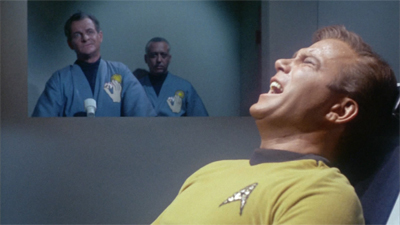






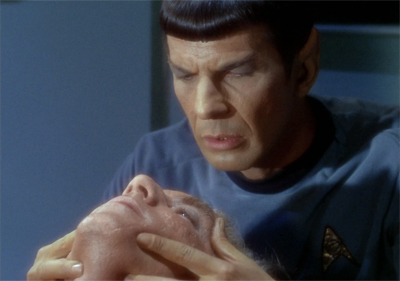


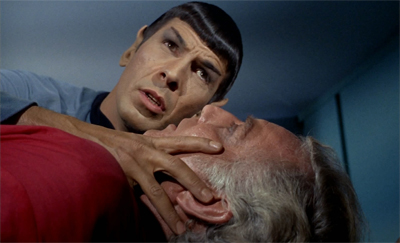
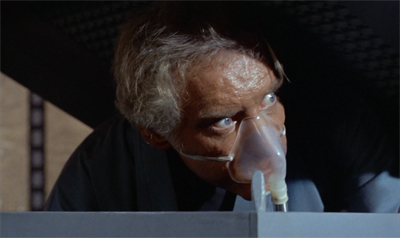








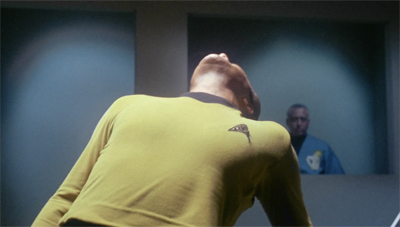

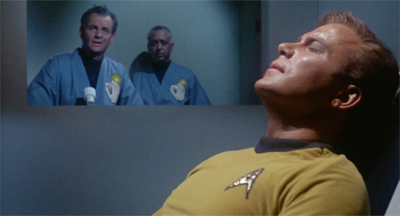





This was great! I look forward to reading your other reviews.
Thanks, glad you enjoyed it!
I love that South Park episode, so forgive me for nitpicking a review that gives it wholly appropriate recognition, but I thought I’d mention that even the weird pronunciation of “planetarium” (written here as “plane’arium”) is a sort of nod to Star Trek. The guy who runs the place is describing his workplace as the kind of locale that viewers might encounter on the show that inspired the episode: it’s “the planet Arium”.
The inspiration of this episode is Cameron’s psychic driving experiments of the late fifties/early sixties. They took place in Montreal, coincidentally Shatner’s birthplace.
Thanks Steven!